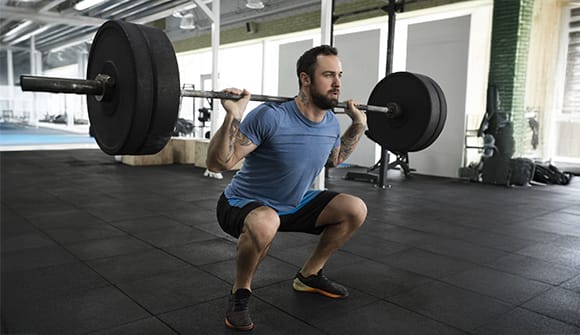How to keep joints lubricated
Flexible joints can keep you looking and feeling strong.
Article Author: Beth Stambaugh
Article Date:

Your joints are designed to let you bend, twist and turn easily, within certain limits. Keeping your joints healthy and flexible is key to your overall health and longevity.
“With every birthday, you’re going to have changes in your joints and that’s natural,” said Joseph Bhagratie, DO, a sports medicine specialist with Baptist Orthopedics. “But there are several things you can do to keep your joints healthy, and in some cases, reverse damage that has already occurred.”
How movement helps joints
“The more you move, the better,” said Dr. Bhagratie.
Movement helps your body create synovium, a thick liquid that lubricates your joints and allows them to move with more ease and less stress. The more you move, the more lubrication through your joints.
Any type of physical activity helps, but it’s always good to switch up your exercise routine.
“Do a variety of activities rather than sticking to the same exercise all the time. This will help you avoid repetitive motion that can cause joint problems over time,” said Dr. Bhagratie.
Changing your exercise routine also helps you develop muscles in areas untouched by your primary activity, and strong muscles help stabilize and protect your joints.
5 tips to improve joint lubrication and health
Looking for more ways to keep your joints healthy and your body moving smoothly? Here are five tips from Dr. Bhagratie.
1. Smart strength training
Dr. Bhagratie highly recommended incorporating weight-bearing exercises into your routine.
“Maintaining strength is key to longevity because it builds up the muscles surrounding your joints and can help regenerate bone growth,” he said.
Exercises that use weight – even those that use your own body weight, like pushups – help to stabilize and support your joints, reducing stress and the risk of injury. Stronger muscles act as a "brace" for the joints, improving their overall function and potentially reducing pain and stiffness.
It’s important not to overdo it, though. Trying to lift too much weight, overtraining and repeating the same movements too often will put a strain on your joints. Learn to listen to your body.
“We need to keep moving while being mindful about our bodies, and never push past joint pain,” Dr. Bhagratie said.
2. The right food is fuel
“Most people aren’t eating enough protein, which is essential for healthy joints,” Dr. Bhagratie said. Protein is necessary for cartilage, tendons and ligaments, all of which allow for flexibility and provide shock absorption. It also contributes to the synovial fluid that lubricates joints.
“Aim for a gram of protein for each pound of your body’s lean muscle mass,” said Dr. Bhagratie. Lean body mass can be determined by subtracting body fat pounds from your total body weight. You can usually have your body fat tested at your primary care physician’s office or through a gym membership.
3. Maintain a healthy weight
The more weight you carry, the more stress on your joints.
“Every extra pound above the waist equals five pounds of stress on your knees,” said Dr. Bhagratie.
While he doesn’t recommend one diet plan over another, Dr. Bhagratie said consuming enough protein and limiting processed foods, as well as including a variety of fruits and vegetables, are smart guidelines to follow.
4. Warm up wisely
We’ve all heard that warming up is important before working out, but many people assume that means holding a stretched position. Called “static stretching,” this type of exercise before a workout can decrease joint stability and reduce muscle performance.
“Instead, do a five-minute dynamic warmup that incorporates a slow, gentle version of the movement you’ll be doing in your workout,” Dr. Bhagratie said. Motions like squats, arm circles or marching in place are good examples. Static stretches are best done after your workout when your muscles are warm.
5. Get enough sleep
Giving your joints appropriate rest is necessary for maintaining their health. Are you getting between seven and nine hours of sleep each night? During the day, it's OK to take a break to relax and alleviate stress on your joints. Adequate rest takes away muscle fatigue after workouts, as well.
Tired of joint pain? We can help.
If you’re experiencing joint pain, talk to your primary care physician or make an appointment with Baptist Orthopedics by calling 904.202.MOVE (6683).
Frequently Asked Questions
Get fresh-picked headlines delivered to your inbox.
Thank you, you're subscribed!
Stories by Topic
Related stories
-

Don't overstrain in your quest to gain
Proper techniques to prevent back pain and injuries while lifting weights.
-

Poor posture
Types of spinal curves and potential treatment options.
-

Is it autoimmune?
When your body’s immune system attacks itself.